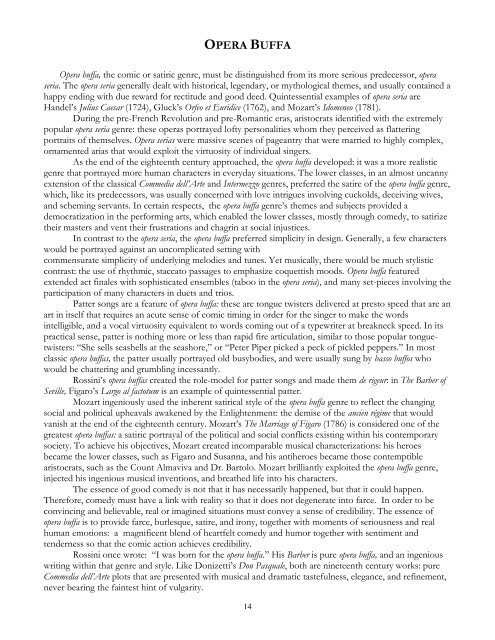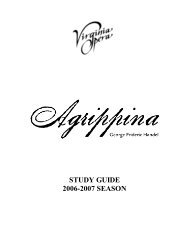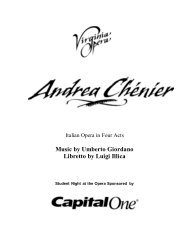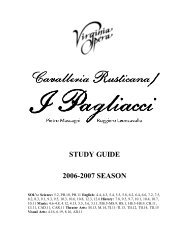The Barber of Seville.pdf - Virginia Opera
The Barber of Seville.pdf - Virginia Opera
The Barber of Seville.pdf - Virginia Opera
Create successful ePaper yourself
Turn your PDF publications into a flip-book with our unique Google optimized e-Paper software.
OPERA BUFFA<br />
<strong>Opera</strong> buffa, the comic or satiric genre, must be distinguished from its more serious predecessor, opera<br />
seria. <strong>The</strong> opera seria generally dealt with historical, legendary, or mythological themes, and usually contained a<br />
happy ending with due reward for rectitude and good deed. Quintessential examples <strong>of</strong> opera seria are<br />
Handel’s Julius Caesar (1724), Gluck’s Orfeo et Euridice (1762), and Mozart’s Idomeneo (1781).<br />
During the pre-French Revolution and pre-Romantic eras, aristocrats identified with the extremely<br />
popular opera seria genre: these operas portrayed l<strong>of</strong>ty personalities whom they perceived as flattering<br />
portraits <strong>of</strong> themselves. <strong>Opera</strong> serias were massive scenes <strong>of</strong> pageantry that were married to highly complex,<br />
ornamented arias that would exploit the virtuosity <strong>of</strong> individual singers.<br />
As the end <strong>of</strong> the eighteenth century approached, the opera buffa developed: it was a more realistic<br />
genre that portrayed more human characters in everyday situations. <strong>The</strong> lower classes, in an almost uncanny<br />
extension <strong>of</strong> the classical Commedia dell’Arte and Intermezzo genres, preferred the satire <strong>of</strong> the opera buffa genre,<br />
which, like its predecessors, was usually concerned with love intrigues involving cuckolds, deceiving wives,<br />
and scheming servants. In certain respects, the opera buffa genre’s themes and subjects provided a<br />
democratization in the performing arts, which enabled the lower classes, mostly through comedy, to satirize<br />
their masters and vent their frustrations and chagrin at social injustices.<br />
In contrast to the opera seria, the opera buffa preferred simplicity in design. Generally, a few characters<br />
would be portrayed against an uncomplicated setting with<br />
commensurate simplicity <strong>of</strong> underlying melodies and tunes. Yet musically, there would be much stylistic<br />
contrast: the use <strong>of</strong> rhythmic, staccato passages to emphasize coquettish moods. <strong>Opera</strong> buffa featured<br />
extended act finales with sophisticated ensembles (taboo in the opera seria), and many set-pieces involving the<br />
participation <strong>of</strong> many characters in duets and trios.<br />
Patter songs are a feature <strong>of</strong> opera buffa: these are tongue twisters delivered at presto speed that are an<br />
art in itself that requires an acute sense <strong>of</strong> comic timing in order for the singer to make the words<br />
intelligible, and a vocal virtuosity equivalent to words coming out <strong>of</strong> a typewriter at breakneck speed. In its<br />
practical sense, patter is nothing more or less than rapid fire articulation, similar to those popular tonguetwisters:<br />
“She sells seashells at the seashore,” or “Peter Piper picked a peck <strong>of</strong> pickled peppers.” In most<br />
classic opera buffas, the patter usually portrayed old busybodies, and were usually sung by basso buffos who<br />
would be chattering and grumbling incessantly.<br />
Rossini’s opera buffas created the role-model for patter songs and made them de rigeur: in <strong>The</strong> <strong>Barber</strong> <strong>of</strong><br />
<strong>Seville</strong>, Figaro’s Largo al factotum is an example <strong>of</strong> quintessential patter.<br />
Mozart ingeniously used the inherent satirical style <strong>of</strong> the opera buffa genre to reflect the changing<br />
social and political upheavals awakened by the Enlightenment: the demise <strong>of</strong> the ancien régime that would<br />
vanish at the end <strong>of</strong> the eighteenth century. Mozart’s <strong>The</strong> Marriage <strong>of</strong> Figaro (1786) is considered one <strong>of</strong> the<br />
greatest opera buffas: a satiric portrayal <strong>of</strong> the political and social conflicts existing within his contemporary<br />
society. To achieve his objectives, Mozart created incomparable musical characterizations: his heroes<br />
became the lower classes, such as Figaro and Susanna, and his antiheroes became those contemptible<br />
aristocrats, such as the Count Almaviva and Dr. Bartolo. Mozart brilliantly exploited the opera buffa genre,<br />
injected his ingenious musical inventions, and breathed life into his characters.<br />
<strong>The</strong> essence <strong>of</strong> good comedy is not that it has necessarily happened, but that it could happen.<br />
<strong>The</strong>refore, comedy must have a link with reality so that it does not degenerate into farce. In order to be<br />
convincing and believable, real or imagined situations must convey a sense <strong>of</strong> credibility. <strong>The</strong> essence <strong>of</strong><br />
opera buffa is to provide farce, burlesque, satire, and irony, together with moments <strong>of</strong> seriousness and real<br />
human emotions: a magnificent blend <strong>of</strong> heartfelt comedy and humor together with sentiment and<br />
tenderness so that the comic action achieves credibility.<br />
Rossini once wrote: “I was born for the opera buffa.” His <strong>Barber</strong> is pure opera buffa, and an ingenious<br />
writing within that genre and style. Like Donizetti’s Don Pasquale, both are nineteenth century works: pure<br />
Commedia dell’Arte plots that are presented with musical and dramatic tastefulness, elegance, and refinement,<br />
never bearing the faintest hint <strong>of</strong> vulgarity.<br />
14






